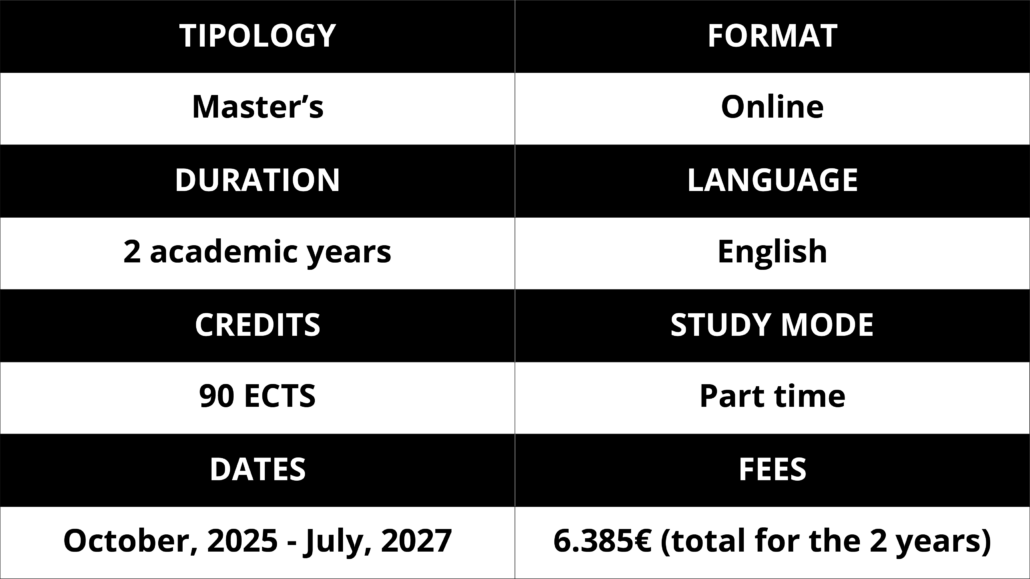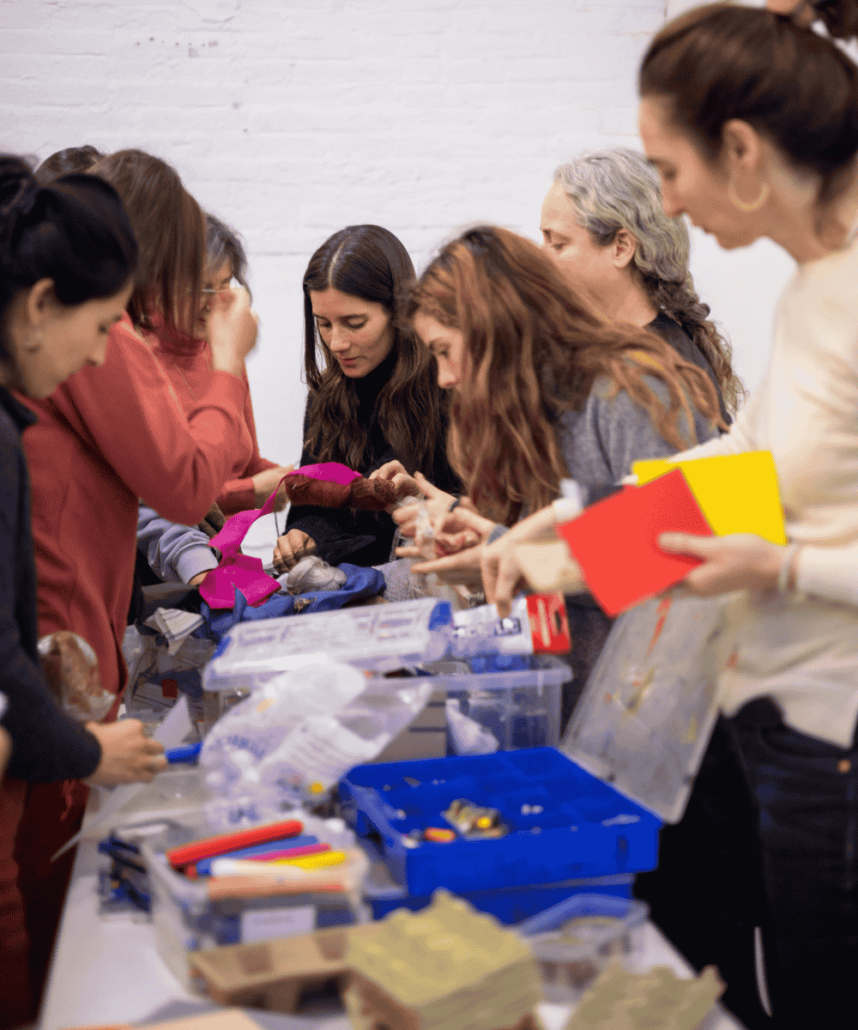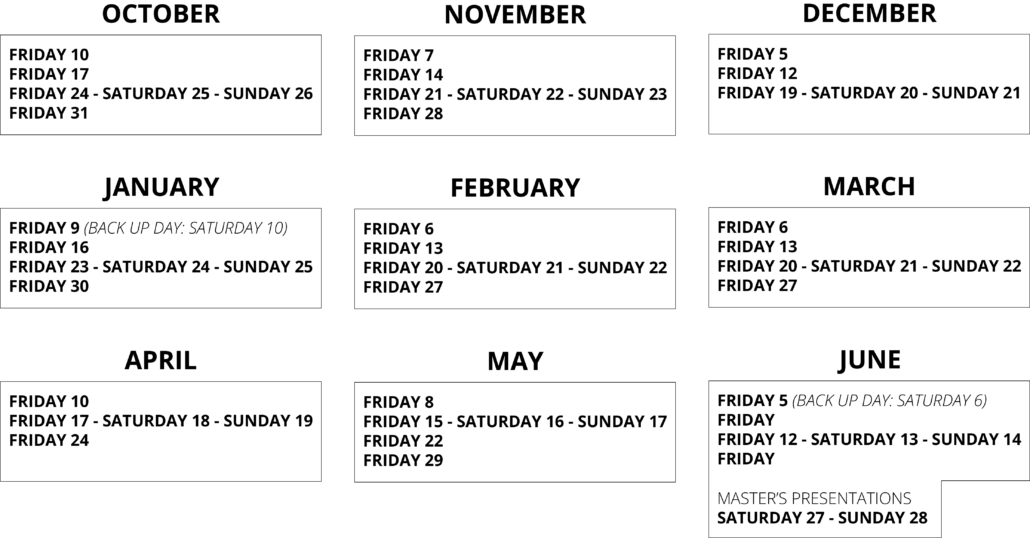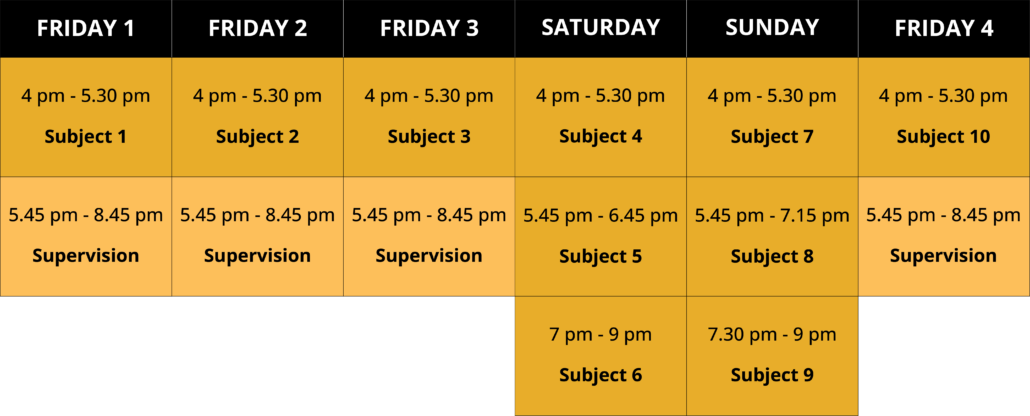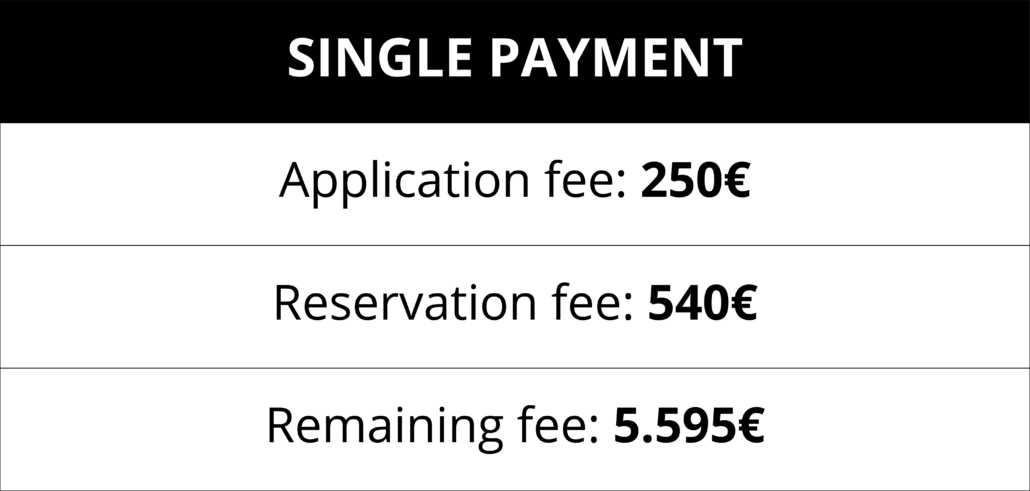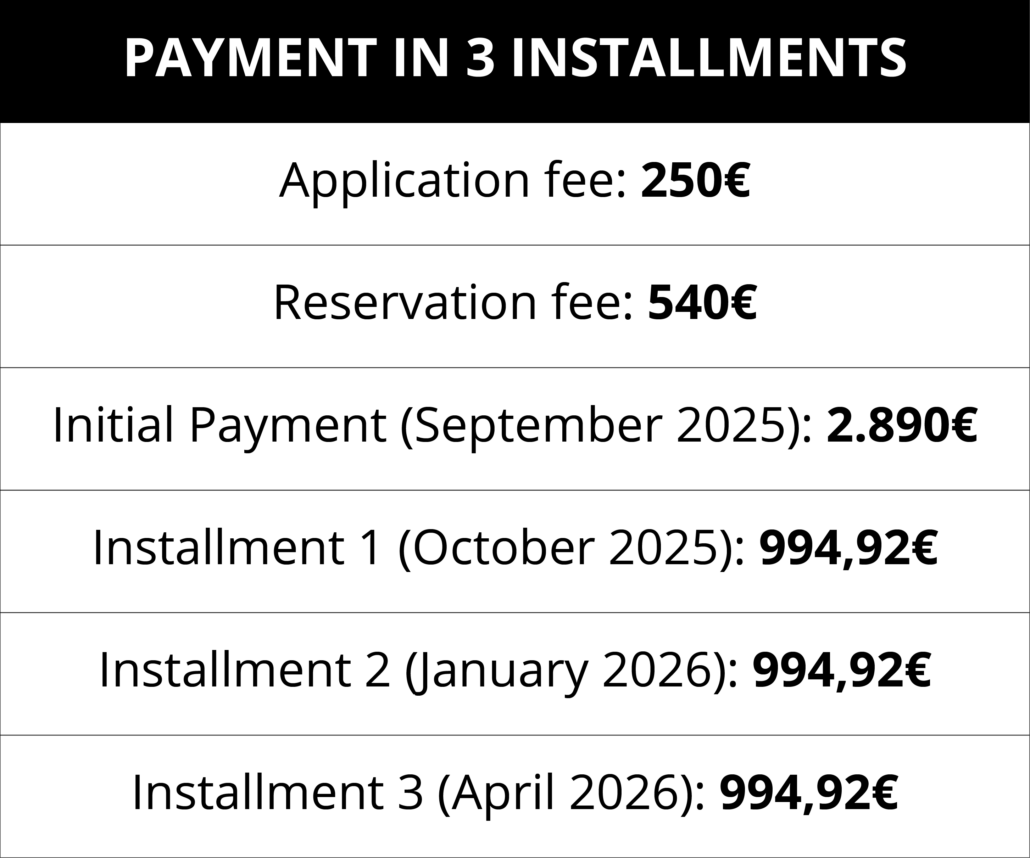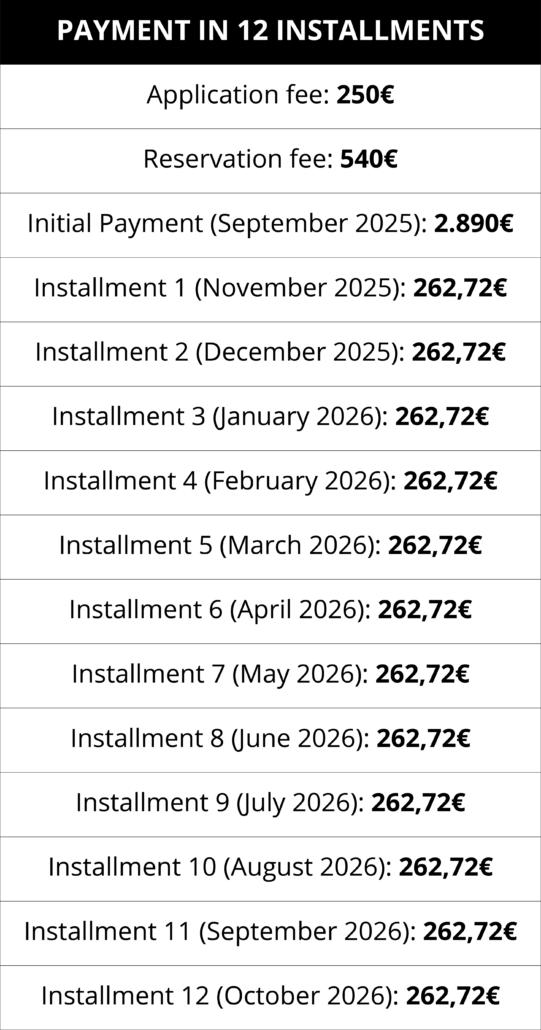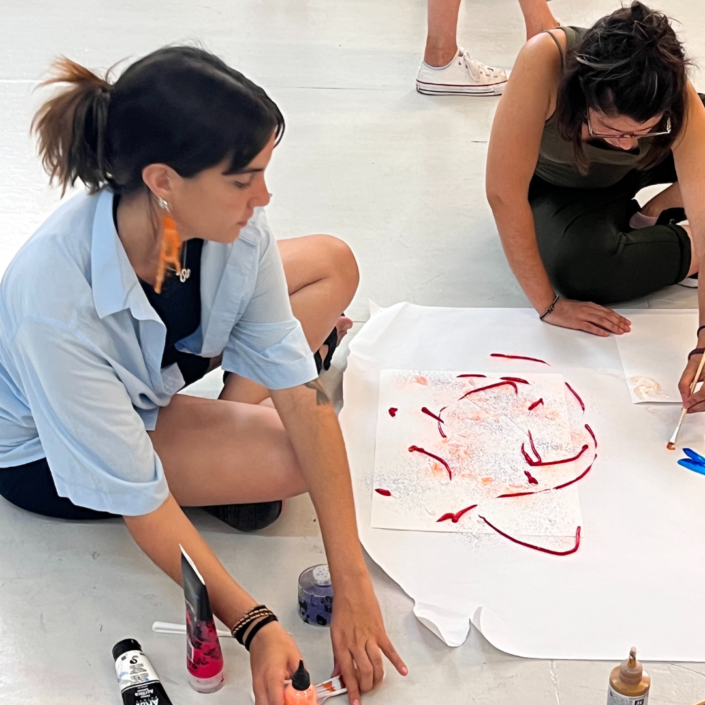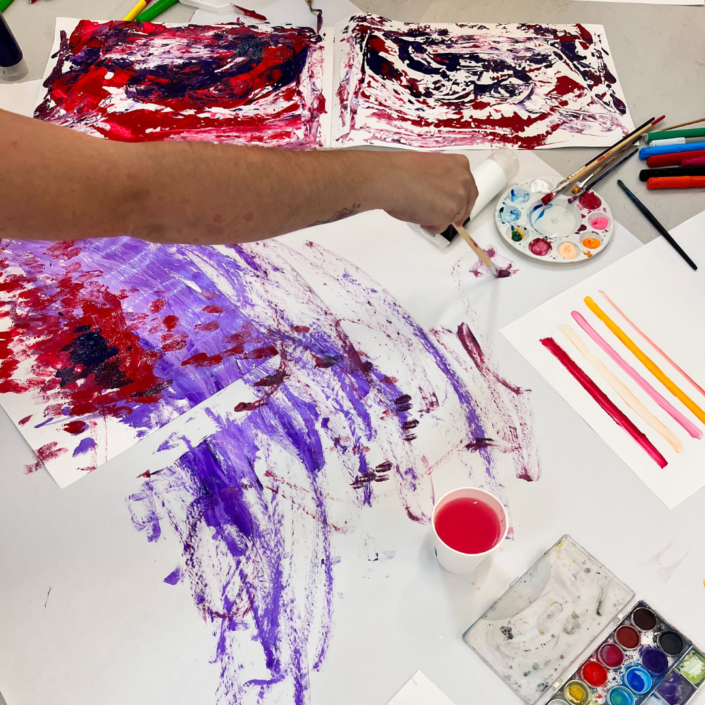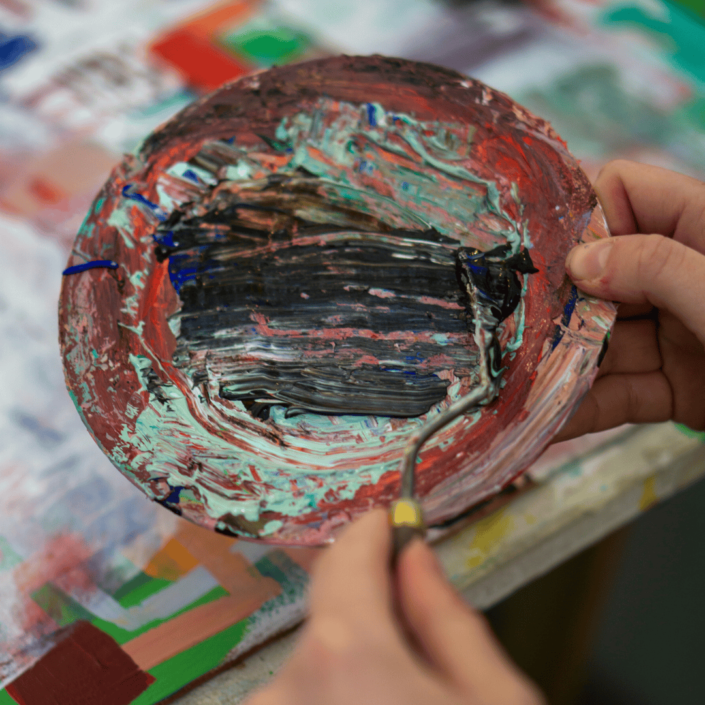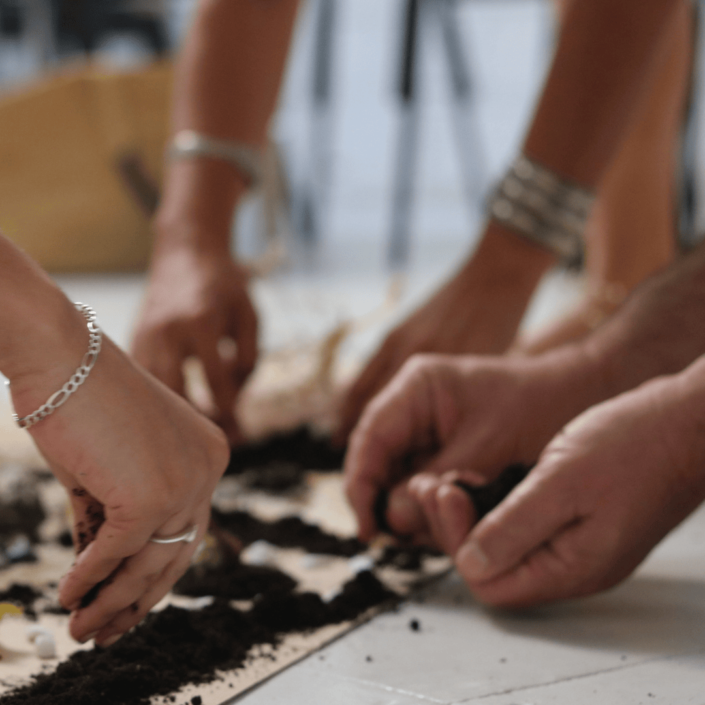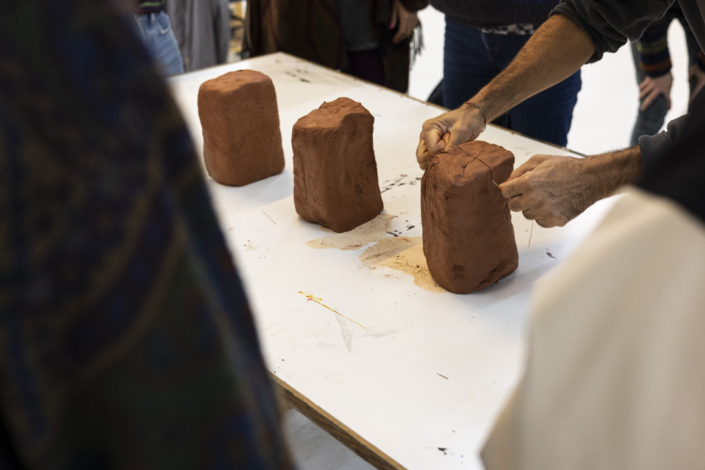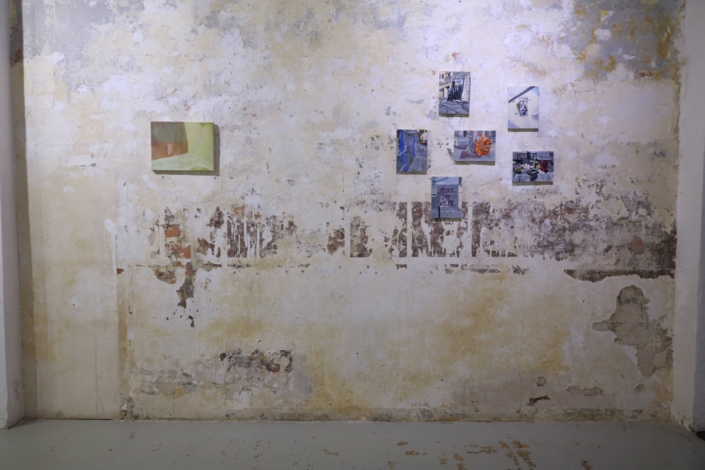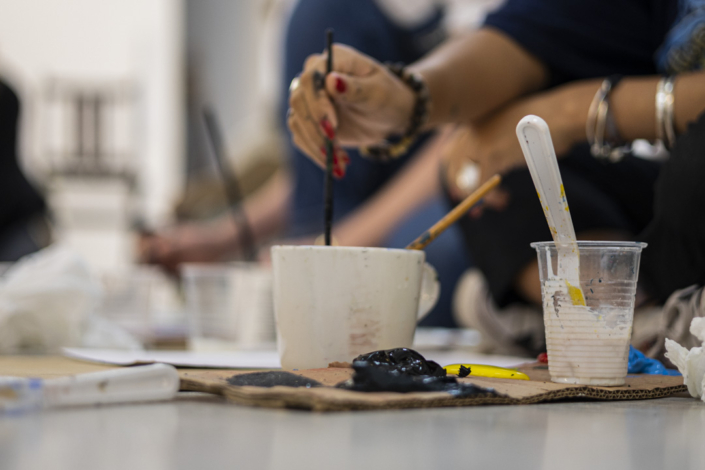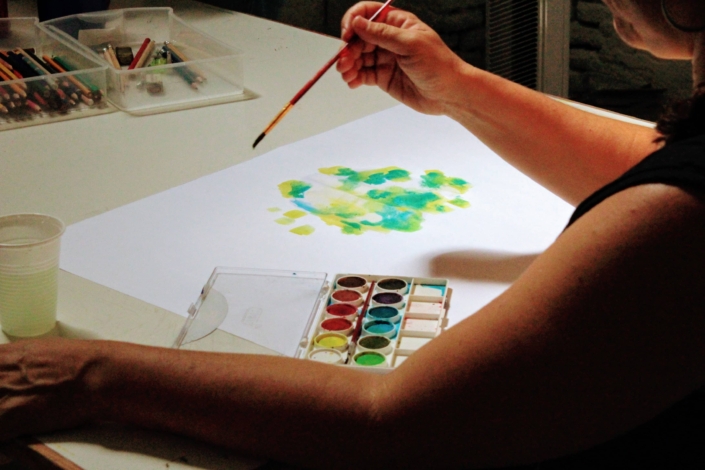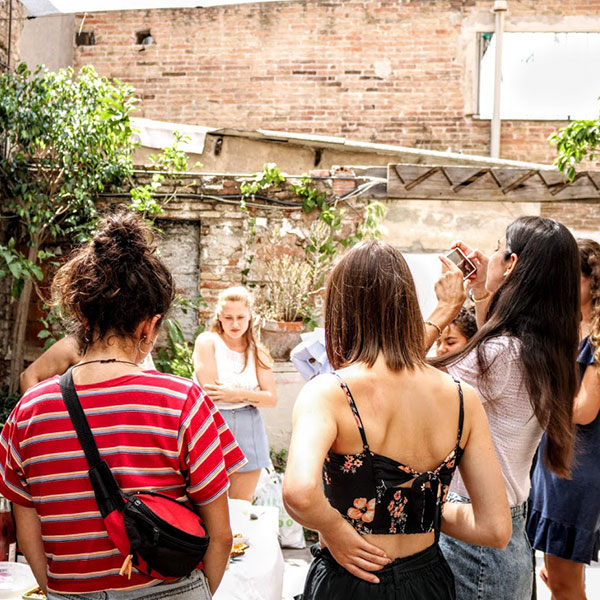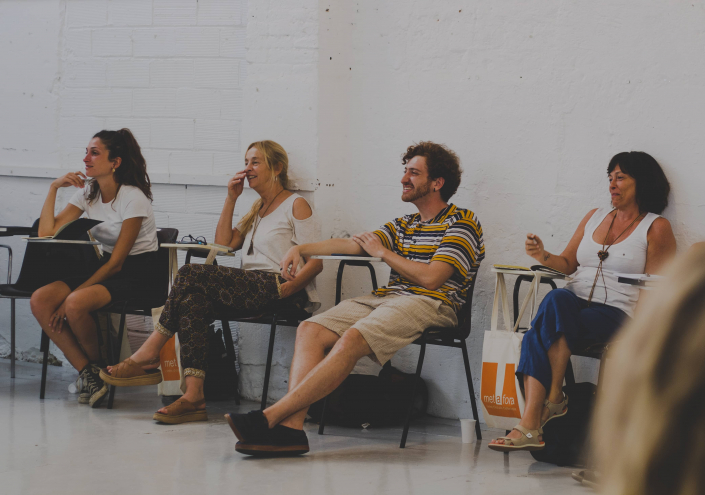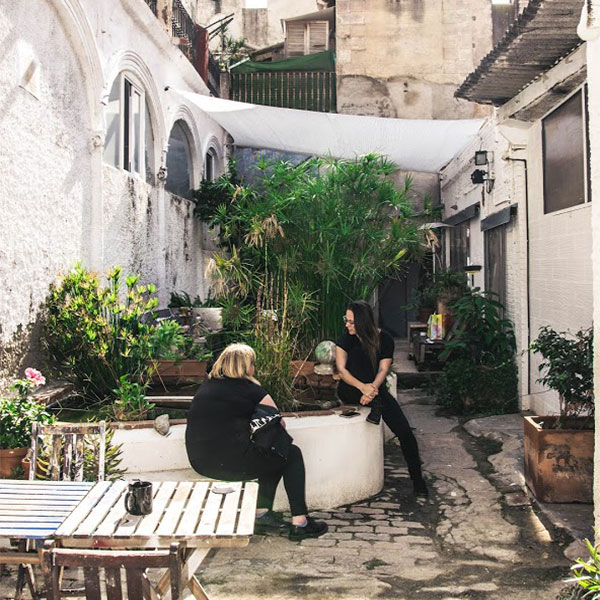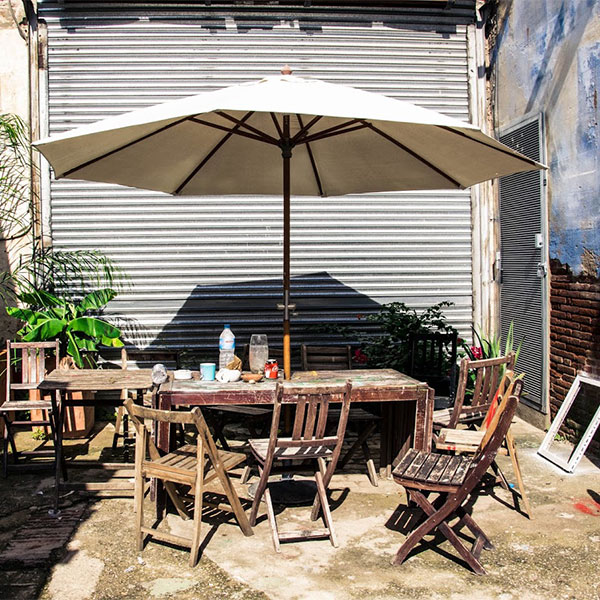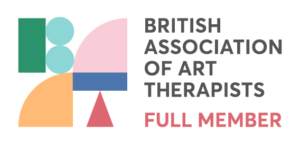WHY CHOOSE METÀFORA?
A FULLY ONLINE
MASTER’S
Train as an art therapist from anywhere in the world with a structured online program designed for interactive and engaging learning.
PROFESSIONAL-LEVEL
TRAINING
A two-year, part-time Master’s that combines in-depth theory, clinical practice and supervision—preparing you for real-world art therapy settings.
A GLOBAL LEARNING EXPERIENCE
Be part of an international community of students and experts, sharing insights and experiences in a rich, multicultural environment.
PROFESSIONAL ART THERAPIST
The culmination of Metàfora’s full art therapy training, providing the skills, knowledge and confidence needed to work as a professional art therapist.
COURSE DETAILS
Metàfora’s Master’s in Art Therapy is one of the most prestigious programs in Europe and Latin America, attracting every year students from over 30 countries worldwide. Conducted entirely online, this two-year, part-time program offers advanced training in art therapy, combining theoretical study, clinical practice and supervision to prepare students for professional practice.
As pioneers in art therapy training in Spanish, Metàfora launched the first Spanish-speaking Master’s in Art Therapy in 1999. Since then, the school has trained over 600 art therapists from five continents, becoming an international benchmark in the field.
This Master’s in Art Therapy is the final level of Metàfora’s full art therapy training. To enroll, participants must have completed the Postgraduate Diploma in Art Therapy and Community Art. The Master’s qualifies students to work as art therapists and is accredited by ATE (Spanish Professional Association of Art Therapists) and FEAPA (Spanish Federation of Art Therapy Associations). The curriculum follows the guidelines of leading art therapy organizations such as AATA (USA), ACAT (Canada) and BAAT (UK), and Metàfora is a member of EFAT (European Federation of Art Therapy).
The Master’s program carries 90 ECTS credits, contributing to the 120 ECTS required for full art therapy training (Postgraduate + Master’s). Of these, 60 ECTS are dedicated to theoretical and experiential learning, while 30 ECTS focus exclusively on clinical practice (750 hours, including 160 hours of supervision).
With over two decades of experience, Metàfora is at the forefront of art therapy education. This Master’s in Art Therapy is the essential final step for those aspiring to establish themselves as professional art therapists and apply art therapy across health, education, social work and the arts.
WHAT YOU WILL LEARN IN THIS ART THERAPY COURSE
Advanced Theories in Art Therapy. Deepen your understanding of the key principles, methodologies and research that shape contemporary art therapy practice.
Clinical Practice and Therapeutic Applications. Gain hands-on experience through 750 hours of supervised clinical practice, applying art therapy in healthcare, education, social work and other kind of settings.
Creative Processes and Expressive Techniques. Explore advanced artistic techniques and their therapeutic applications, refining your ability to facilitate creative expression in clients.
Group Dynamics and Therapeutic Facilitation. Develop expertise in leading individual and group art therapy sessions, understanding interpersonal dynamics and therapeutic interventions.
Ethics, Supervision and Professional Identity. Learn about the ethical responsibilities of an art therapist, engage in 160 hours of professional supervision and shape your unique therapeutic approach.
Case Studies and Research in Art Therapy. Analyze real-life case studies, engage with the latest art therapy research and develop your ability to critically assess intervention strategies.
Final Step to Professionalization. As the culmination of Metàfora’s full art therapy training, this master’s qualifies you to work as a professional art therapist and apply art therapy across diverse sectors everywhere in the world.
PROGRAM
The Master’s in Art Therapy aims to prepare art therapists to be able to practice the profession inside and outside of Spain. For this reason, the essence of the course lies in clinical practices and supervision sessions. Students will acquire diverse conceptual tools, utilizing them in art therapy projects in institutions in both the public and private health networks, education centers and social assistance centers. In total, the Master’s students carry out 600 hours of clinical practice in addition to 160 hours of supervision.
In the Master’s, practical and theoretical knowledge acquired during the Postgraduate Diploma in Art Therapy training as well as in the path of self-knowledge through the artistic processes, is reinforced and consolidated.
Throughout the program, students specialize in one area of therapeutic work while acquiring the necessary knowledge to work in other specific areas. These areas range from art therapy in mental health contexts and special education, to childhood, adolescence, and the elderly, as well as in the prison population, etc.
MODULE 1: ART THERAPY (34 ECTS)
ART THERAPY TRAINING GROUPS (13,5 hours)
The objective of experiential group art therapy is to explore the dynamics of a group in which images and art objects are produced. Students remain in the same small group throughout the two years of the Master’s program.
The session is divided divided into two parts: first, the students create, then, they generate a dialogue around these creations. Guided by a facilitator, the participants discover, little by little, through the experience of creating, some of the situations that give name to the different concepts that form the theory of art therapy. The role of the leader of the group is to help the members be the ones who explore and reveal the dynamics that occur within the interactions of the group.
OBSERVATION AND EXPRESSION TECHNIQUES (13,5 hours)
This is an extension of the experiential art therapy groups, with the objective of approaching psychotherapeutic work through observation, reflection and communication. The composition of the groups and their leaders are the same as in experiential art therapy groups. Students meet in this group for a monthly session.
The objective of this session is to acquire skills when observing situations or artistic processes, reflect on what is observed, whether the object of observation is oneself, the other, or a group situation, and explore creative ways to communicate our experience to others.
THEORY OF ART THERAPY (27 hours)
This is an introduction to the prominent authors and ways of working that characterize our profession. The theory of art therapy is explored through its history, theoretical framework and other aspects that shape the discipline with examples of practical applications and intervention modalities, with special emphasis on the Relational model, Mentalization and recent implementation of art therapy.
The objective is not only to discover the theoretical definition of the contents, but also to promote the capacity for reflection and emphasize the empowerment of bibliographic reading, two fundamental aspects for the development of the profession. At the same time, we will delve into the various aspects that make up this discipline and its variety of applications and possibilities within the proposed theoretical framework.
Contents:
- The internship; observation periods, assessments and first interviews, institutions and systems theory, interruptions and endings, records, notes, response works.
- Techniques and levels of intervention in art therapy
- Art therapy and Mentalization
- Therapist functions
- Art therapy and Families
- Online Art Therapy
- Art therapy groups
- Art therapy and Trauma
- Art therapy and Grief
METHODOLOGY (21 hours)
Art therapy is a young profession that still needs a body of research to support it. Much of the work of art therapists is to publicize their findings and therefore contribute to the development of the profession. This course introduces students to the fundamentals of research and teaches them how to evaluate clinical work and how to write about it.
Contents:
- bibliographic search tools
- formalities of writing and the art of writing (suggestions of the APA standards)
- ethical considerations
- critical and reflective thinking
- research methodologies in art therapy
- theory and practice in art therapy
- art based research
- case study development
- evaluations and reports
- final work of the master
ACADEMIC WORKS (125 hours)
Academic work is carried out over the two years of training. Those of the first year consist of a bibliographic review and the development of a clinical session, which will serve as the basis for the final master’s project or thesis in the second.
ART THERAPY APPLICATION WORKSHOPS (15 hours)
Just like case presentations, workshops are an opportunity to learn about the different areas where art therapy is applied, expand resources, and experiment with different artistic proposals.
The invited art therapist provides a theoretical introduction about a specific group and then invites the students to experiment and discuss the proposed creative dynamics.
CASE PRESENTATIONS (5 hours)
These sessions are dedicated to presenting clinical work carried out in different centers by Metáfora’s team of art therapy professionals, as well as invited art therapists. In these meetings, professionals present in detail the course of cases and treatments carried out in different groups.
READING GROUPS (9 hours)
In the reading group sessions, students complete bibliographic reviews and analyze and debate art therapy texts (books or articles) proposed for this subject. Group work on essential readings facilitates the understanding and integration of art therapy theory.
RESOURCES FOR PROFESSIONAL DEVELOPMENT (6 hours)
This subject provides the tools and knowledge necessary to develop as professional art therapists. It addresses fundamental topics for professional practice, such as ethical issues, clinical supervision, intersectionality and the importance of continuing education. The main objective is to understand and address the ethical, practical and social challenges that art therapists face in their professional practice, thus promoting a reflective and responsible approach.
MODULE 2: ART (14 ECTS)
CONTEMPORARY ART STRATEGIES (13,5 hours)
At the beginning of the 20th century, the art scene experienced an unprecedented expansion through the so-called ‘avant-garde movements’. The laws that governed artistic practices up to now were dissolved in favor of a freedom that opened up perspectives and the range of possibilities. Contemporary art, heir to this revolution, continues to break schemes and enter unsuspected terrain that forces the expansion of aesthetic and intellectual horizons. In this theoretical course we will review some works of art to analyze the different strategies used in recent visual arts.
ARTISTIC PRACTICE (230 hours)
It is essential that students maintain a continuous artistic practice. A minimum weekly dedication is recommended for the development of personal creative processes, promoting the development of the identity of the art therapist and artist, as a form of self-care and as a research tool, taking into account that this practice does not include the monthly tasks of the TOE group, nor the proposals of the artistic workshops.
ART WORKSHOPS (12 hours)
This subject aims to continue bringing the student closer to contemporary art, addressing theoretical, technical, material, and creative process aspects. Throughout the course, various professionals from the current art scene conduct these theoretical-experiential workshops.
MODULE 3: PSYCHOLOGY (12 ECTS)
THEORY OF PSYCHOTHERAPY (27 hours)
In this module, a series of nine annual conferences present students with the theory and practice of relational psychoanalytic psychotherapy. This is one of the conceptual bases for which the art therapy taught in this course originates.
Contents:
- relational psychotherapy and the psychotherapist
- emotions and concepts that guide the psychotherapeutic process
- curiosity
- intimacy
- shame, resentment and hate
- true guilt and false guilt
- joys and sorrows
- transference and countertransference
- emotional preparation for the practice of psychotherapy
PSYCHOPATHOLOGY (27 hours)
This subject acts as a guide to distinguish the different psychopathologies to support students in their practices. During one year of the master’s degree, the course is devoted to the psychopathology of childhood and adolescence, and in the second year to the psychopathology of adulthood.
First year contents:
- introduction to relational psychopathology
- adult development and aging
- neurosis and psychosis
- depressive and manic disorders
- anxiety and obsessive disorders
- trauma-related and somatic symptom disorders
- eating and sexuality disorders
- schizophrenic, delusional and paranoid disorders
- personality disorders and addictions
- psychopathology of old age and mourning processes
Second year content:
- child psychopathology
- the child and their environment
- attachment theory and mentalization concept
- neurodevelopmental and motor disorders
- specific learning and communication disorders
- anxiety and depressive disorders
- trauma-related disorders and stressors
- disruptive and impulse control disorders
- obsessive-compulsive and eating disorders
THEORY OF GROUP ANALYSIS (12 hours)
Part of the art therapist’s work is done in user group sessions within larger groups or institutions. Possessing a theoretical knowledge about group behavior is essential to understanding the institutional dynamics as well as the user group.
Contents:
- advantages and disadvantages of making a group
- therapeutic factors of a group, the matrix
- starting a group, patient selection, group size
- the initiator and co-therapy
- internal and external factors
- institutions and their relationship with our therapy groups
- dynamic elements in group therapy
- our fears and doubts
- responsibilities, reality criteria and objectives
NEUROPSYCHOLOGY (9 hours)
These classes offer an introduction to the structure and main functions of our brain, its normal and pathological functioning, and its ability to change, create and interact. The objective of this subject is to introduce the student to the main neuroimaging techniques and the reading of scientific articles, so that they can understand mental processes and therapeutic processes.
Contents:
- the emotional brain
- neural plasticity, definition and basic principles
- neuroimaging and the technical devices that allow it
- the anatomy and function of major neurological structures
- memory
- contributions about mental disorders
- the brain, psychotherapy and artistic processes
MODULE 4: PRACTICUM (30 ECTS)
SUPERVISION (168 hours)
Supervision of the practices is carried out in small groups that meet weekly to monitor the clinical work. The participation of the students in the development and analysis of cases allows for exploring the individual experiences from the multiple perspectives that the group device offers. Supervision includes the artistic work of the art therapist through the “artistic response” and the use of Role Play or staging of situations to broaden the exploration of clinical material.
For the blended format group, supervision is held in-person at Metáfora one Friday a month. For the group that takes the online training, all the sessions are online.
PLACEMENT PRACTICE (700 hours)
The most notable feature of the Master’s in Art Therapy lies in the clinical internships. Students undertake 700 hours spread over two years in healthcare or educational centers with which Metàfora establishes collaborative agreements. These hours include direct interaction with users, meeting and coordination hours with the collaborating institution, and hours dedicated to note-taking and preparation for supervision.
INDIVIDUAL TUTORIALS (1,5 hours)
Throughout the course, the tutors meet individually with their students to monitor their training process. The tutors, who at the same time are the supervisors of the practices, are responsible for the correction and evaluation of the academic work by their students.
FINAL PRESENTATIONS (18 hours)
Second-year master’s students, in their final year of training, showcase their practicum work through case presentations. These presentations mark the culmination of their comprehensive training in art therapy, offering a reflection on their clinical experience.
Each student presents a summary of the work carried out during their practicum with an individual or specific group—an essential component of the two-year master’s program.
The process begins in January with an internal rehearsal, followed by a presentation for fellow Metàfora students. Finally, at the end of the course, students deliver a public presentation. Attendance at the final presentations is mandatory for all students.
This event provides a valuable opportunity to gain firsthand insight into the diverse applications of art therapy through real case studies.
CALENDAR & SCHEDULE
FIRST YEAR (2025/26)
SECOND YEAR (2026/27)
Certain classes require a series of materials such as paper, crayons, pencils, paints, clay, modeling clay, fabrics, old magazines, bits and pieces of clothing, glue and anything that can be used as a sort of art material.
NOTES:
The subjects indicated in the schedule below are illustrative, the final programming is provided to the students at the beginning of the course.
Likewise, we inform that in Europe, two time changes occur each year. On the last Sunday of March, the clocks go forward one hour (2am becomes 3am). On the last Sunday of October, the clocks go back one hour (3am becomes 2pm).
FEES & PAYMENT OPTIONS
Payment Structure:
- Application Fee (250€) – Covers administrative procedures. Refundable if not admitted.
- Reservation Fee (540€) – Secures your spot after admission.
Payment Options for the Remaining Fees:
- Single Payment – Full tuition paid at once, no later than 4 weeks before the course starts.
- 3 Installments – (+5% surchargeon the remaining balance).
- 12 Installments – (+8% surcharge on the remaining balance).
Limited spots – Your place is only guaranteed after payment of, at least, the reservation fee.
PAYMENT CONDITIONS
1. Reservation Fee
To apply for admission to the postgraduate diploma, students must complete the registration form. Once the form is received and reviewed by the academic team, the applicant will be contacted to proceed with the payment of the reservation fee or the total course fee.
The reservation fee is deducted from the total course fee upon admission and is essential to secure a place in the program.
The reservation fee is non-refundable under any circumstances, except if the application is rejected by Metàfora. In such cases, the fee will be refunded as promptly as possible.
If the student cancels or postpones their enrollment, the amount paid will remain valid for a maximum of 12 months from the start date of the originally enrolled course (see postponement conditions in the relevant section).
2. Payment of the Course Fee
If the student has reserved their place by paying the reservation fee, the remaining balance of the course fee must be paid no later than 30 days prior to the course start date.
Failure to make the payment within the stipulated time frame may result in the loss of the reserved place and the student being moved to the waiting list.
Once the course has started, no refunds will be issued (either partially or in full) if the student cancels or postpones their participation.
3. Payment in Installments
Students have the option to pay the remaining course fee in installments:
- 4 installments: subject to a 5% surcharge on the deferred amount.
- 7 installments: subject to an 8% surcharge on the deferred amount.
Installments must be paid between the 1st and 5th of each corresponding month, as per the payment schedule established by Metàfora.
In the event of late payment, a €20 surcharge will be applied for each week of delay.
4. Postponements and Course Changes
Students wishing to postpone their participation or transfer to another course must notify Metàfora in writing at least 6 weeks before the start of the originally enrolled course.
Conditions for postponement or change:
- The amount paid will remain valid for a maximum of 12 months from the start date of the original course.
- A €250 fee will be charged for processing the postponement, which will be added to any outstanding balance.
- If the new course has a higher cost, the student must pay the difference. If the cost is lower, the remaining balance will be retained as credit for future Metàfora activities, valid for an additional 12 months.
Requests for postponement or course changes are subject to availability and the admission requirements of the new course.
No refunds will be issued under any circumstances.
5. Interruptions in Participation
5.1 Due to Involuntary Causes
- In the case of an accident or illness, the student may request a voucher for the amount paid, valid for any Metàfora course within a 12-month period.
- A medical certificate must be provided to justify the cause.
5.2 Due to Voluntary Causes
If the student voluntarily interrupts their participation after the course has started:
- No refunds will be issued (either partially or in full).
- The student will lose their place and must fulfill their financial commitments. Under no circumstances does voluntarily interrupting the course exempt the student from the financial obligations they have contracted with the school.
- To resume studies in the future, the student will need to initiate a new enrollment and payment process.
6. Payment Methods
Payments can be made via:
- Credit card: online, by phone, or in person at Metàfora.
- Bank transfer: it is essential to include the student’s full name and the course name. Metàfora will not be held responsible for payments without this information.
- Cash: exclusively at Metàfora’s offices.
All international bank transfer fees must be borne by the sender. If any fees are incorrectly charged to Metàfora, the amount will be reclaimed from the student before the course begins.
Important Note
Submission of the registration form and payment of the corresponding fee constitute full acceptance of these terms.
ADMISSION REQUIREMENTS
- Have a Postgraduate Diploma in Art Therapy
- Have a university degree
- A level of English equivalent to B2 is required. An official certificate is not mandatory, but students must have sufficient language proficiency to follow the classes and actively participate in the master’s program activities.
- Be over 23 years of age.
- Carry out a minimum of 84 hours of personal didactic psychotherapy during the two years of training (the psychotherapists chosen for didactic therapy must meet minimum training and professionalism requirements that are compatible with the training provided in the master). Find more information about the didactic psychotherapy here.
APPLICATION PROCESS FOR THE MASTER’S IN ART THERAPY
- Verify the Admission Requirements: Ensure that you meet the detailed admission requirements.
- Prepare the Following Required Documents:
- Diploma and Certificate of the university degree.
- Diploma of the Postgraduate Diploma in Art Therapy (if completed). If you’ve completed the postgraduate (or an equivalent training) at another institution, we will schedule an online interview with a member of the academic committee.
- Artistic portfolio (PDF or URL with up to 10 significant works).
- Complete the Application Form: Fill in the fields of the form to access the Application Form.
- Payment of Admission Application Fee (250€): In the event of non-admission, the fee will be refunded.
- Evaluation by the Academic Committee: Your application will be evaluated by the academic committee.
- Application Period: From April 11 to May 12.
- Admission Resolution Date: The resolution will be notified by email during the week of June 16–22.
- Payment of Remaining Reservation Fee (540€). If admitted, you’ll receive instructions to pay the remaining amount of the reservation fee, from June 23 to June 30.
Questions? Contact us at:
+34 93 330 00 89 | at@metafora.org
CREDITS, DIPLOMA & EVALUATION
At Metàfora we use an integral evaluation methodology to assess the progress of our students. This type of assessment combines qualitative and quantitative analysis.
The assessment or qualitative analysis is not quantifiable and refers to the nature and quality of learning, it takes into account the personal strengths and weaknesses of the student with a view to working as a future therapist. The assessment is continuous, it is carried out throughout the training: the student’s personal commitment to the course is assessed as well as her/his personal development, which implies her/his ability to generate trust in others, to create consistent emotional bonds and to sustain difficult emotions. The Master also values the skills acquired in clinical practice, such as the ability to create and sustain a therapeutic framework, the ability to integrate theory into practice and learning in supervision.
The academic or quantitative evaluation contemplates the percentage of attendance and assignments completed, as well as the evaluation of academic papers. It is carried out in two specific moments of the course.
The integral evaluation method consists of an average of the two aforementioned sections, sum of assessment and academic. It takes into account both personal skills and academic achievement and ultimately decides whether the student passes or fails the course.
The results of the integral evaluation can be PASS, FAIL and NOT PRESENTED.
TESTIMONIALS FROM FORMER STUDENTS
ABOUT METÀFORA
Our mission is to empower professionals and aspiring therapists from diverse backgrounds to harness the transformative power of art. Whether you’re a psychologist, psychotherapist, artist, social worker, nurse, teacher, occupational therapist, or medical professional, Metàfora offers a dynamic learning environment to expand your skill set and unlock the therapeutic potential of art.
At Metàfora, we believe in personalized education that fosters both personal and professional growth. Our diverse range of training programs empowers students to explore various art therapy approaches and techniques. Led by highly qualified experts, our curriculum delivers exceptional training and support.
Immerse yourself in Barcelona’s vibrant artistic heritage while acquiring world-class art therapy education.
Our commitment to innovation and student well-being has positioned Metàfora as a leading institution for those seeking to transform lives through the power of art.

